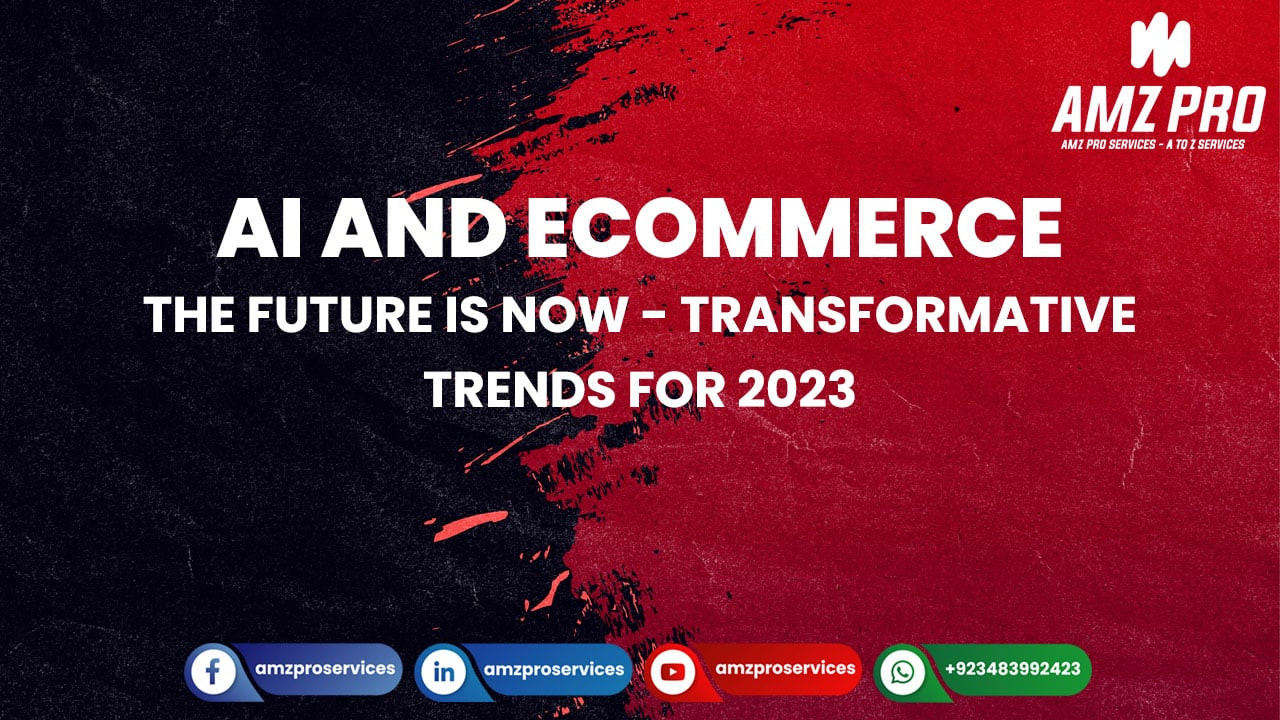AI and Ecommerce: The Future is Now - Transformative Trends for 2023
Artificial Intelligence: The Game-Changer in E-commerce for 2023
Artificial intelligence (AI) has grown from a futuristic concept to a practical solution across various industries, none more so than e-commerce. From personalized product recommendations to enhanced customer service, AI is revolutionizing e-commerce and the way businesses interact with their customers.
The Emergence of AI in E-commerce
AI emerged as a key player in e-commerce by mimicking human intelligence, enabling computers to learn, analyze, understand, and reason. The growth of AI in e-commerce is powered by the abundance of data generated by online interactions and transactions, coupled with advances in machine learning algorithms and computational power.
Understanding the Impact of AI
AI's ability to analyze and learn from vast amounts of data allows e-commerce businesses to create a personalized and seamless shopping experience. It facilitates a customer journey that is tailored to individual preferences, thereby boosting customer satisfaction and, ultimately, sales.
AI for Personalized Product Recommendations
One of the most prominent applications of AI in e-commerce is personalized product recommendations. AI algorithms analyze user behavior, preferences, and past purchases to predict what products a customer might be interested in. This personalized approach increases the likelihood of purchase, enhances customer satisfaction, and drives revenue growth.
AI for Fraud Detection
In the world of e-commerce, fraud can be a significant issue. AI-powered systems can help mitigate this risk by detecting unusual patterns and potentially fraudulent activity. By learning from historical transaction data, these systems can identify potential threats and alert businesses, thus safeguarding both the business and the customers.
AI for Enhanced Customer Service
AI has made significant strides in customer service with the advent of chatbots and virtual assistants. These AI-powered tools can handle a range of customer queries around the clock, providing instant support and freeing up human agents to handle more complex issues.
AI in Inventory Management
AI can also play a pivotal role in inventory management. It can predict demand based on trends, seasonality, and other factors, helping businesses to optimize their inventory levels and avoid overstocking or understocking issues.
Optimizing Search with AI
AI can significantly enhance the search functionality on e-commerce sites by understanding user intent and delivering more accurate and relevant results. This can lead to a better user experience and increased conversions.
The Role of AI in Marketing
AI is transforming digital marketing strategies in ecommerce. From personalizing email marketing campaigns to optimizing paid ads, AI is helping businesses reach their target audience more effectively and efficiently.
The Future of AI in Ecommerce: 2023 and Beyond
The future of AI in ecommerce looks promising. We can expect AI to become more integrated into ecommerce platforms, making them more user-friendly and efficient. AI-powered virtual shopping assistants, voice commerce, and visual search are some of the trends to watch out for in 2023.
Challenges and Ethical Considerations
While AI offers immense opportunities, it also comes with challenges. These include the need for high-quality data, the risk of bias in AI algorithms, and ethical considerations around data privacy and security. Ecommerce businesses must address these issues to leverage AI effectively and responsibly.
Leveraging Machine Learning
Machine learning, a subset of AI, has had a significant impact on ecommerce. With machine learning algorithms, systems can learn from data and make predictions or decisions without being explicitly programmed. This technology enables better customer segmentation, dynamic pricing, and predictive forecasting in ecommerce, enhancing both the customer experience and business performance.
AI and Mobile Commerce
Mobile commerce or m-commerce has seen exponential growth in recent years. AI is playing a crucial role in this sphere as well, powering personalized app experiences and seamless mobile checkouts. Voice assistants like Siri, Alexa, and Google Assistant, backed by AI technology, are expected to drive more mobile-based ecommerce transactions in the future.
AI and AR/VR in Ecommerce
The integration of AI with other emerging technologies like Augmented Reality (AR) and Virtual Reality (VR) is creating immersive shopping experiences. Customers can visualize products in their environment or virtually try on products, like clothes or makeup, before making a purchase. This kind of enhanced shopping experience reduces the likelihood of returns and increases customer satisfaction.
Sentiment Analysis with AI
AI-powered sentiment analysis tools can help ecommerce businesses understand customer feelings towards their brand, products, or services. By analyzing data from social media, product reviews, and customer feedback, these tools can provide valuable insights into customer sentiment, helping businesses improve their offerings and customer service.
AI in Supply Chain Management
AI is also transforming supply chain management in ecommerce. It's being used to predict demand, optimize logistics, manage inventory, and improve delivery times. These improvements lead to cost savings, increased efficiency, and a better customer experience.
The Need for AI Transparency
With AI becoming more prevalent in ecommerce, there's a growing need for transparency. Customers want to know when and how AI is being used, especially when it comes to their data. Ecommerce businesses need to ensure they are transparent about their use of AI and take steps to safeguard customer data.
AI for Sustainable Ecommerce
AI can also contribute to more sustainable ecommerce practices. By optimizing logistics and supply chains, AI can help reduce carbon footprints. Moreover, AI can help in minimizing packaging waste by determining the most efficient packaging for each product.
Building AI-Ready Ecommerce Businesses
As AI continues to evolve, ecommerce businesses must ensure they are AI-ready. This involves not only integrating AI technologies but also building a data-driven culture, upskilling employees, and investing in high-quality data.
Preparing for an AI-Driven Future
To prepare for an AI-driven future, ecommerce businesses need to stay abreast of the latest developments in AI and understand how they can apply to their operations. This involves continuous learning, innovation, and flexibility.
Conclusion: The Age of AI in Ecommerce
Artificial Intelligence is revolutionizing ecommerce, providing a plethora of opportunities for retailers to optimize their operations and enhance the shopping experience. From personalized product recommendations to superior customer service and fraud detection, AI's applications in ecommerce are vast and impactful.
As we approach 2023, AI's role in ecommerce is expected to strengthen, becoming an integral part of the industry. Ecommerce businesses that can adapt to this change, embrace AI, and harness its power stand to gain a significant competitive advantage.
Embracing AI is more than adopting new technology; it's about transforming the way we do business. With its potential to deliver personalized experiences, increase efficiency, and drive growth, AI is not just shaping the future of e-commerce; it's redefining it.
By understanding and harnessing the power of AI, e-commerce businesses can position themselves for success in the AI era. While challenges exist, those that can navigate these challenges and leverage AI effectively will emerge as leaders in the e-commerce landscape of 2023 and beyond.
Predictive Analytics and AI
Another critical application of AI in e-commerce is predictive analytics. By analyzing customer behavior and trends, AI can predict future outcomes, such as which products a customer is likely to buy or when they are likely to make a purchase. This enables e-commerce businesses to anticipate customer needs and proactively tailor their offerings.
Data Privacy and AI
In the era of AI and big data, ensuring data privacy is more critical than ever. E-commerce businesses need to respect customer privacy and ensure they are using data responsibly. AI can play a role in protecting data by detecting potential breaches and ensuring compliance with data protection regulations.
AI-Driven Pricing Strategies
AI is also revolutionizing pricing strategies in e-commerce. Dynamic pricing models, powered by AI, adjust prices in real time based on supply, demand, and other market factors. This enables e-commerce businesses to maximize their profitability while remaining competitive.
Artificial Intelligence and Cybersecurity
With the rise of e-commerce, cybersecurity threats have become a significant concern. AI can play a pivotal role in enhancing cybersecurity. By identifying patterns and anomalies, AI can detect potential threats and prevent cyber-attacks, thus ensuring the security of e-commerce platforms and protecting sensitive customer data.
Conclusion: The Path Forward
As we navigate through 2023, it’s clear that AI will continue to revolutionize the e-commerce landscape. Its capabilities to provide personalized experiences, safeguard transactions, enhance customer service, and offer predictive insights are propelling the industry into a new era of innovation and growth.
However, the path forward requires awareness of the inherent challenges. Ethical concerns about data privacy and potential biases in AI systems need to be addressed. Businesses need to assure customers that their data is safe and that AI systems are used responsibly and fairly.
E-commerce retailers must also invest in skills development. As AI becomes more integral to operations, a workforce that understands and can work alongside AI will be crucial. Training existing staff and hiring new talent with AI expertise should be part of any e-commerce business's strategy.
AI in e-commerce is not just about technology; it’s about a strategic transformation. It's about using technology to understand and serve customers better, to optimize operations, and to create a sustainable competitive advantage. The future belongs to those businesses that can harness the power of AI and use it to drive innovation and growth.
To stay ahead in the e-commerce game in 2023 and beyond, businesses must embrace AI, not as an optional tool but as a strategic imperative. The journey might be challenging, but the potential rewards – increased efficiency, higher customer satisfaction, and improved profitability – make it a journey worth embarking on.
In conclusion, as AI continues to advance and become more sophisticated, its impact on e-commerce will only grow. Businesses that understand and adapt to this shift will not only survive but thrive in this new AI-driven e-commerce landscape. Let's embrace the possibilities and opportunities that AI presents, and together, we'll redefine the future of e-commerce. AI is not just a revolution; it's an evolution that's taking e-commerce from what it is today to what it could be – a truly personalized, efficient, and remarkable experience. Are you ready for the ride?

